North Korea crisis: Ballistic missile 'moved to the coast' - latest news

US will present new UN sanctions resolution to punish North Korea
Nikki Haley says North Korea 'begging for war' after nuclear test
South claims to have seen indications North is to launch missiles
Warning as it holds live-fire drills after Kim Jong-Un nuclear test
North says its enemies are 'hell-bent on escalating confrontation'
US has warned threat would trigger 'massive military response'
Boris Johnson urges against strike as North could 'vaporise' Seoul
What is North Korea's missile range? Everything you need to know
North Korea has reportedly moved an intercontinental ballistic missile (ICBM) towards its west coast, as the US said Pyongyang was "begging" for war.
North Korea had been spotted moving a rocket that appeared to be an ICBM towards its west coast, South Korea's Asia Business Daily, citing an unidentified source, reported on Tuesday.
The rocket started moving on Monday and was spotted moving only at night to avoid surveillance, the report said.
South Korea's defence ministry, which warned on Monday that North Korea was ready to launch an ICBM at any time, said they were unable to confirm the contents of the report.
The report came as the US ambassador to the UN warned that North Korea was “begging for war” and the United States’ patience has almost run out.
Nikki Haley made the comments to the United Nations as she sought to turn the widespread international condemnation of the rogue state’s nuclear test into hard-hitting action to stop the country in its tracks.
Ms Haley told an emergency meeting of the UN Security Council that “enough is enough”, and described calls by China and Russia for the US to tone down its rhetoric as “insulting”.
“When a rogue regime has a nuclear weapon, and an Inter-Continental Ballistic Missile pointed at you, you do not take steps to lower your guard,” she said.

Pyongyang was reported on Monday to be preparing for another ICBM test, to follow on from Sunday’s nuclear test – a move which would be deeply provocative, and emphasise Ms Haley’s point that 24 years of diplomacy have failed.
But China and Russia both warned against taking hasty measures.
President Vladimir Putin called his South Korean counterpart, Moon Jae-in, on Monday, with both men condemning the test and Mr Putin emphasising that he believed diplomacy was the only solution.
Sergei Ryabkov, the Russian deputy foreign minister, said that any "clumsy steps" could make the situation worse, and a political resolution was needed.
"Those who are stronger and smarter should show restraint," he said.
"Any clumsy step could lead to an explosion."
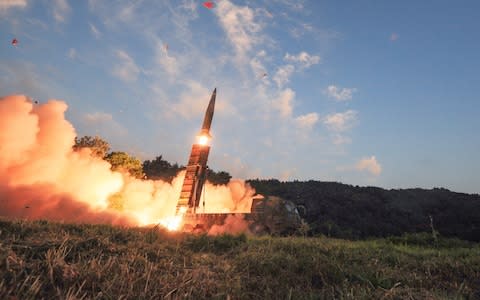
China, North Korea’s protector, echoed Russia in condemning the test, but urged the North and South to focus on working towards a peaceful resolution of the conflict that has left the Korean Peninsula divided since the 1950s.
Describing the situation as a “vicious circle”, Liu Jieyi, China’s ambassador to the UN, said: “China will never allow chaos and war on the Peninsula.”
President Donald Trump spoke to Mr Moon, with their two countries agreeing earlier in the day to lift a 500kg limit currently placed on warheads in its territory.
The White House said the pair agreed "to maximise pressure on North Korea using all means at their disposal." They also pledged to strengthen joint military capabilities.
But Mr Trump has boxed himself into an uncomfortable situation with South Korea, having lashed out at Seoul for being naïve with their suggestions of diplomacy, and seething at the trade deficit between the two countries.
Switzerland on Monday offered to be a mediator between North Korea and its increasingly antagonistic partners.
South Korea responded to the sixth nuclear test with live-fire drills off its eastern coast, which were meant to simulate an attack on the North's main test site. Their defence minister, Song Young-moo, said he believes the North has successfully miniaturised a nuclear weapon to fit onto a missile.

North Korea said that its enemies are "hell-bent on escalating confrontation", as it launched a scathing attack on the “warmongers” in Seoul.
Ms Haley announced that the US was circulating a draft sanctions resolution, which would be voted on on Monday.
The council aimed to take a big bite out of the North Korean economy earlier this month by banning the North from exporting coal, iron, lead and seafood products - about a third of the country's $3 billion in exports last year. Options now being considered are believed to include a ban on other profitable North Korean exports, such as textiles, or restricting oil imports.
“Dialogue will always be our end goal,” said Matthew Rycroft, Britain’s ambassador to the UN.
“But returning to dialogue without a serious sign of intent from Pyongyang would be a set up to failure. North Korea must change course to allow a return to dialogue. Were they to do so, the opportunity exists to end this crisis.”

Nuclear bomb on Seoul 'would kill 2 million'
An estimated 2 million residents of Seoul would be killed if a nuclear weapon of the same size as the device tested by North Korea on Sunday detonated above the South Korean capital, reports Julian Ryall.
As North Korea has gradually elevated the yield of its nuclear weapons, the US and South Korean governments have conducted repeated tests simulating the explosion of increasingly potent warheads on the city and its population.
A test carried out by the US Defense Department in 1998 - fully eight years before the North was able to carry out its first underground test - simulated the detonation of a 15-kiloton warhead over the US military's Yongsan garrison, in the centre of Seoul.
North Korea 'moving an ICBM'
South Korea's Asia Business Daily, citing an unidentified source, reports that North Korea has been spotted moving a rocket that appeared to be an intercontinental ballistic missile (ICBM) towards its west coast.
The rocket started moving on Monday and was spotted moving only at night to avoid surveillance, the report said.
South Korea's defence ministry warned on Monday that North Korea was ready to launch an ICBM at any time.
War would be 'catastrophe'
Australia's prime minister says a war with North Korea would be a catastrophe as he urged China to help bring the regime "to their senses."
Prime Minister Malcolm Turnbull told Nova 96.9 radio in Sydney:
"It would be so damaging to the world, to the region, to the global economy. It would be a catastrophe.
"That is why everybody that has leverage over North Korea should use it now to bring them to their senses."
China is the North's closest ally and commercial partner. The comments follow North Korea's latest nuclear test on Sunday.
South Korean navy holds major live-fire drills in warning to North
South Korea's navy held major live-fire drills on Tuesday morning to warn the North against any provocations at sea, it said, two days after Pyongyang's biggest nuclear test to date.
"If the enemy launches a provocation above water or under water, we will immediately hit back to bury them at sea," Captain Choi Young-chan, commander of the 13th Maritime Battle Group, said in a statement.
Trump approves in theory the lifting of restrictions on South Korean missile payload limits
The US president gave his approval "in principle" to lift restriction on South Korea's missile payload capabilities, the White House has said.
Trump agreed to strengthen joint military capabilities during a call with South Korean President Moon Jae-in and gave "conceptual approval" for South Korea to buy billions of dollars of weapons from the United States.
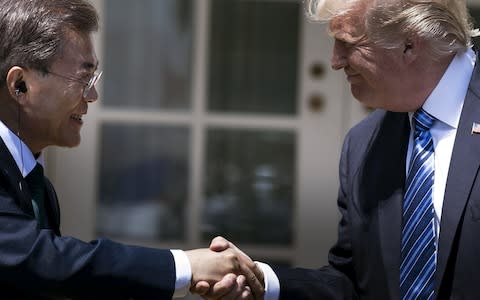
Merkel and Trump agree on tougher sanctions
Angela Merkel, the German chancellor, and Mr Trump have condemned North Korea's nuclear test and urged the United Nations to quickly agree on tougher sanctions against Pyongyang, a German government spokesman said.
"Both agreed that the test of a hydrogen bomb means a new and unacceptable escalation by the North Korean regime," Steffen Seibert said in a statement after they spoke by telephone.
"The German chancellor and the American president expressed the view that the international community must continue to exert pressure on the regime in North Korea and that the United Nations Security Council has to quickly adopt further and stricter sanctions," Mr Seibert added.
For her part, Mrs Merkel told Mr Trump that Germany would push for tougher sanctions against North Korea by the European Union, Mr Seibert said, adding: "The aim is to dissuade North Korea from its violations of international law and to achieve a peaceful solution to the conflict."
As the US pushes for new UN sanctions, here are the ones already in place
The United States announced on Monday that it will present a new UN sanctions resolution to punish North Korea for its sixth and most powerful nuclear test.
The UN Security Council has imposed seven sets of sanctions on North Korea since it first tested an atomic device in 2006.
Here's a look at the UN sanctions in place, which have progressively been tightened:
Arms embargo
The Security Council first imposed an arms embargo and a ban on a range of imports and exports to prevent North Korea from conducting nuclear tests or launching ballistic missiles in October 2006.
In June 2009 the ban was extended to all military material, financial transactions and technical training related to the supply and use of arms, nuclear and missile technology.
In 2013 that provision was further strengthened to allow countries to seize and destroy material connected to North Korea's weapons programs.
In 2016, the council expanded sanctions to include mandatory inspections of all cargo from North Korea at all airports and ports.
Travel, luxury goods, assets
A UN sanctions committee was established in 2006 to put together a blacklist of persons and entities deemed to be providing support to North Korea's banned programs. The sanctions list currently contains 62 individuals and 50 entities.
The targeted sanctions provide for a global travel ban and a freeze on their assets.
All countries have to prevent the sale of luxury goods, like watches and sports equipment, to North Korea, a measure designed to hit Pyongyang's elites.
Exports
In March 2016, the council toughened sanctions by banning exports of coal, iron and iron ore from North Korea, except in cases where the revenue did not benefit the North Korean military or Pyongyang's nuclear program.
Pyongyang was also prohibited from exporting gold, titanium and rare minerals used in high tech products and can no longer buy aviation fuel including rocket fuel, except for passenger planes.
On November 30, 2016, in a new resolution, the UN tightened the noose, capping exports of North Korean coal to China, which is currently the only market for North Korean coal.
In August, after two launches of intercontinental ballistic missiles, the council imposed a total ban on exports of coal, iron and iron ore, lead and lead ore, fish and seafood.
It also froze work permits for North Korean laborers sent abroad to earn hard currency for the regime.
Are sanctions effective ?
Experts and diplomats agree that sanctions have a limited impact and are only one tool in the broader international effort to persuade North Korea to change its behavior.
UN sanctions experts have reported to the council that North Korea has found ways to circumvent sanctions and that implementation by UN member-states is weak.
Some diplomats argue that the most recent sanctions have been significantly tougher, targeting North Korea's economy, and that those will take some time to have an impact.
China has steadfastly rejected calls for an oil embargo, fearing that an economic collapse in neighboring North Korea would lead to chaos and a more dangerous security crisis on the Korean peninsula.
Meanwhile, individual countries have imposed unilateral sanctions, notably the United States, the European Union and Japan.
Is North Korea a threat to the UK?
Watch our Reality Check video:
Trump and Moon agree to lift limits on the South's missiles
Donald Trump and South Korea's leader Moon Jae-In have spoken.
In what may be seen as a further escalation, the pair agreed to remove limits on the payload of the South's missiles, Seoul's presidential office said, as the UN Security Council met to discuss a response to Pyongyang's sixth and most powerful nuclear test.
The two leaders in a phone call "agreed to lift the cap on missile payload of South Korea as an effective countermeasure" against Pyongyang's test on Sunday of what it described as a hydrogen bomb designed for a long-range missile, the presidential office said in a statement.
Seoul was perviously restricted to a maximum warhead weight of 500 kilogrammes (1100 pounds) on its ballistic missiles, according to a bilateral agreement with the United States.
US to propose ramping up sanctions
The latest coming out on the wires is that the US will present a North Korea sanctions resolution at the UN, and is aiming for a vote in a week.
AP reports US Ambassador Nikki Haley telling the Security Council: "The United States will be circulating a resolution that we want to negotiate this week and vote on Monday."
More details will follow.
China: Beijing will 'never allow chaos and war on Korean peninsula'
China's UN envoy has said Beijing will "never allow chaos and war on the Korean peninsula".
Donald Trump due to speak to South Korean President on Monday
President Donald Trump is scheduled to speak with South Korean President Moon Jae-on Monday amid intensifying tensions with North Korea.
The call comes as the UN Security Council is holding its second emergency meeting in a week about North Korea.
Trump has also threatened to halt all trade with countries doing business with the North, a veiled warning to China. He also faulted South Korea for its "talk of appeasement."
'When a rogue regime has a nuclear weapon... you do not take steps to lower your guard'
Ms Haley urged the UN Security Council to impose the "strongest possible measures" against North Korea. She said:
"Only the strongest sanctions will enable us to resolve this problem through diplomacy.
"When a rogue regime has a nuclear weapon and an ICBM pointed at you, you do not take steps to lower your guard.
"No one would do that. We certainly won't."
The United States, Britain, France, Japan and South Korea requested the urgent meeting after North Korea detonated what it described as a hydrogen bomb designed for a long-range missile.
Ms Haley declared that the "time for half measures is over," suggesting the council must significantly ratchet up the pressure with biting sanctions to be decided in a new resolution.
The US ambassador did not spell out what measures Washington would support, but diplomats have indicated that an oil embargo would have a crippling effect on the North Korean economy.
Japan, France and Britain called for the swift adoption of a new sanctions resolution, but the call was expected to face opposition from Russia and China which maintain that sanctions alone will not resolve the crisis.
US Ambassador: Kim Jong-un is 'begging for war'
Nikki Haley, the US Ambassador to the United Nations, has said North Korean leader Kim Jong-un is "begging for war".
America does not want war, Ms Haley, said, "but our country's patience is not unlimited" adding that "enough is enough".
She told the United Nations Security Council in New York: "We must now adopt the strongest possible measures on North Korea."
Ms Haley described China's so-called freeze proposal on North Korea as "insulting".
'We cannot waste any more time': Japan urges UN Security Council to act
Japan has urged the UN Security Council to agree on a plan to draft a new sanctions resolution to punish North Korea after its sixth nuclear test.
"We cannot waste any more time," Japanese Ambassador Koro Bessho told reporters ahead of an emergency council meeting on Monday afternoon.
"We need North Korea to feel the pressure - if they go down this road there will be consequences."
'Stop the Kimsanity': How latest nuclear test was reported around the world
North Korea is again on many newspaper front pages after Kim Jong-un's regime claimed a "perfect success" for its most powerful nuclear test so far. Click here to see how regional and world media reacted.

Artificial intelligence a bigger threat to civilisation than North Korea, Elon Musk claims
Elon Musk, the billionaire technology entrepreneur, has suggested that artificial intelligence is a greater threat to civilisation than the North Korean regime, reports James Titcomb.
In a series of tweets on Monday, the chief executive of Tesla and SpaceX said that "AI superiority at national level [is the] most likely cause" of a third world war.
Musk, who has put millions of dollars into trying to ensure that AI is developed safely, regularly raises fears about AI.
China, Russia, soon all countries w strong computer science. Competition for AI superiority at national level most likely cause of WW3 imo.
— Elon Musk (@elonmusk) September 4, 2017
May be initiated not by the country leaders, but one of the AI's, if it decides that a prepemptive strike is most probable path to victory
— Elon Musk (@elonmusk) September 4, 2017
However, many big names in the tech industry accuse him of scaremongering about a Terminator-like future and misrepresenting what AI is capable of. Click here to read more.
US dollar struggles in wake of North Korea nuclear tests
The US dollar struggled on Monday as North Korea's latest nuclear tests prompted a rush to unwind bets, with the euro the only notable exception to the broad market sell-off.
Both the Japanese yen and the Swiss franc notched up chunky gains against the dollar after news on Sunday of North Korea's sixth and most powerful nuclear test.
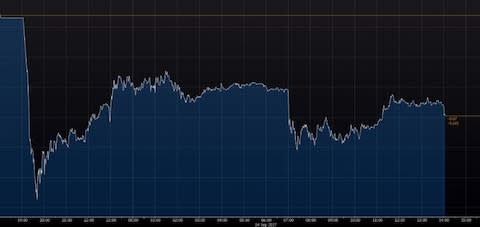
"The reaction in the markets is a classic risk-off reaction to the geopolitical events but a notable exception is the continued euro strength," said Neil Jones, head of hedge fund sales at Mizuho Bank Ltd in London.
The euro rose half a percent against the dollar at $1.19 and not far away from a 2-1/2 year high above $1.20 hit last Tuesday. It is up more than 13 per cent against the dollar this year.
Putin joins other world leaders in denouncing North Korea at summit overshadowed by nuclear test
The BRICS group of five major emerging economies on Monday denounced North Korea's latest nuclear test at a summit in China that seeks to enlarge the organisation's presence on the world stage.
The nations - Brazil, Russia, India, China and South Africa - agreed in a joint declaration to strengthen cooperation against a range of organisations it described as terrorist, including some based in Pakistan.

In the 43-page declaration, Xi, Indian Prime Minister Narendra Modi, Russian President Vladimir Putin, Brazilian President Michel Temer and South African President Jacob Zuma said they would work together to improve global economic governance to foster "a more just and equitable international order."
They also strongly condemned North Korea's sixth - and most powerful - nuclear test that took place Sunday and has overshowed the two-day BRICS summit in the southeastern Chinese city of Xiamen that China is using as a showcase for its growing international status.
Voice of triumph or doom: Who is North Korea's veteran newsreader?
Wearing a pink Korean dress and flashing a wide smile, television presenter Ri Chun Hee delivered the news of Pyongyang's sixth nuclear test with her usual gusto.
Using her trademark bombastic delivery, Ri announced on state television on Sunday the hydrogen bomb test was "a perfect success!" and a key step in "completing the state nuclear force."
But who is the 74-year-old grandmother? She is considered a national hero who first took to the airwaves in 1971, leaving a career in acting for the broadcaster Korean Central Television (KCTV).
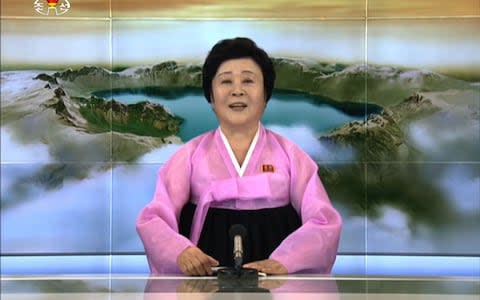
Ri's dramatic flare set her apart from other announcers - whether she was angrily denouncing the West or boasting of the regime's achievements and the strength of its leaders.
"She's the perfect person to voice North Korea's hard-line stance," said Ahn Chan-il, a high-ranking North Korean defector who now lives in South Korea.
"There is no one else who has that power in her voice as she does. It's just right for talking about nuclear weapons or missiles," Ahn said.

Ri, who usually wears a traditional Korean dress known as a hanbok, has also shown a softer side. She famously wept on air when announcing North Korea's founder Kim Il Sung's death in 1994.
When his son Kim Jong Il died in 2011, it was Ri - clad in black funeral clothes and her voice trembling - who delivered the news to North Koreans.
Despite officially retiring in 2012, Ri has been brought back for major announcements. Click here to read more.
More from Downing Street on options for dealing with North Korea
Here's more from the a regular Westminster media briefing on Monday. A Number 10 spokeswoman told reporters: "As the Prime Minister made clear yesterday, and the Foreign Secretary made clear, our focus is on working with partners to increase pressure on North Korea and find a diplomatic solution to the crisis."
Pressed over whether military action, including a nuclear strike, would be an appropriate response, the spokeswoman said:
"We've condemned the test in the strongest possible terms. We are calling for tougher action to have North Korea stop this dangerous and destabilising activity.
"Our focus is on how we increase pressure and come to a peaceful solution, including at the UN today... It's our view in the UK overwhelmingly that peaceful diplomatic means are best."
Mrs May made clear during her visit to Japan last week that she wanted to look at the possibility of increasing the pace of implementation of sanctions on the Pyongyang regime, said the spokeswoman.
Asked if this could include an oil blockade, the spokeswoman said:
"Our view is that there are further sanctions we could consider.
"There are lots of additional restrictions we could look at on a range of imports and things like restrictions on North Korean workers overseas.
"We expect all of that to be discussed and we will be part of that discussion."
The spokeswoman said Mrs May believes China, which is Pyongyang's closest ally and biggest trading partner, could be doing more.
She added: "China has leverage over North Korea and we should be encouraging them to use that leverage to ensure North Korea stop their illegal acts. That is very much the view of the Prime Minister."
Theresa May on North Korea: 'Peaceful, diplomatic means are best'
A spokeswoman for Prime Minister Theresa May said: "Our view is that peaceful, diplomatic means are best when dealing with North Korea."
She added that the British government is "looking at all measures to put pressure on North Korea".
Swiss ready to play mediator role in North Korea crisis, president says
Neutral Switzerland is prepared to act as mediator to help resolve the North Korea crisis, including by hosting ministerial talks, Swiss President Doris Leuthard has said.
Leuthard said Swiss troops were deployed on the demarcation zone between South Korea and North Korea and the country had a long history of neutral diplomacy. But China and the United States had to take their share of responsibility, she added.
"We are ready to offer our role... as a mediator," Leuthard told a news conference. "It is really time now to sit down at a table. Big powers have a responsibility."
South Korean markets suffer steepest lost in more than three weeks
Emerging markets have been shaken by North Korea's most powerful nuclear test yet, with stocks suffering their steepest loss in more than three weeks while South Korea's currency plumbed multi-week lows.
The MSCI's Asia Pacific emerging stock index fell 0.7 percent in its steepest daily decline in more than three weeks. The benchmark was dragged lower by falls in heavyweight South Korea, which tumbled nearly two per cent before closing 1.2 percent lower - the weakest close in three weeks.
Hong Kong weakened 0.7 percent, Russian dollar-stocks fell 1 percent and bourses in South Africa and Turkey slipped 0.4 percent.
Currencies also felt the tremors. South Korea's won took the biggest hit, weakening one per cent against the greenback. Other currencies also eased against a softer dollar.
South Korean Defence Minister Says North Korea Preparing For Possible ICBM Launch. Sharp Fall In Markets, Nifty 100 Pts Off From Days High. pic.twitter.com/dq7mllOp2w
— BTVI Live (@BTVI) September 4, 2017
"We have seen a typical knee-jerk reaction across global markets," Phoenix Kalen, strategist at Societe Generale, said, adding investors were trying to assess the possible response of major powers to the test.
"That has resulted in a slight bit of emerging market FX softness, which is reversing some of the gains last week after the soft (U.S.) non-farm payrolls and the signs that the ECB might be becoming a little more cautious (about euro strength)."
South Korea security officials seek harder line on Pyongyang
Here's more from Neil Connor in Beijing:
Security officials in Seoul are distancing themselves from President Moon Jae-in’s policy of rapprochement with North Korea, as calls grow louder for Mr Moon to take a different direction, South Korean news agency Yonhap reports.
Mr Moon has faced growing criticism over his policy of promoting sanctions while reaching out for dialogue with Pyongyang.
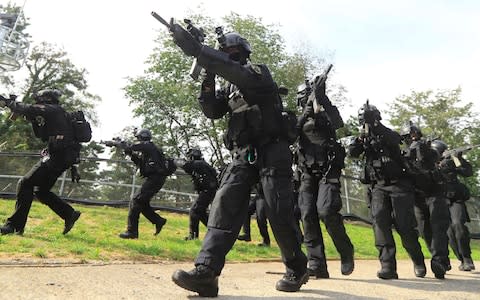
Song Young-moo, Seoul's defence minister, said: "During a National Security Council meeting views converged on a direction that strengthens the military standoff, rather than the Berlin declaration or dialogue.”
The Berlin declaration refers to Mr Moon’s policy towards North Korea which was outlined in the German city in July.
South believes North has warhead-sized nuclear weapon
South Korea believes the North has successfully miniaturised a nuclear weapon to fit onto a missile, Seoul's defence minister said on Monday.
"We believe it fits in an intercontinental ballistic missile," Song Young-Moo told lawmakers at a parliamentary briefing, a day after Pyongyang's biggest nuclear test to date.

North Korea: Enemies are 'hell-bent' on escalation
North Korea has launched a scathing attack on the “warmongers” in Seoul, along with South Korea’s allies in Washington and Tokyo, following Sunday’s missile launch, reports Neil Connor in Beijing.
Official media in Pyongyang criticised the response from the South Korea "puppet forces” in calling for more UN action against the North and the “introduction of nuclear strategic assets into South Korea”.
“This is not only the height of the persecution mania of those upset by the recent launch of the Juche weapon but also useless racket of those hell-bent on escalating confrontation,” said a commentary from the Rodong Sinmun newspaper, according to the official KCNA news agency.
Juche is North Korea’s home-grown ideology which promotes self-reliance and devotion to the country’s rulers.
Analysis: What does Kim Jong-un hope to achieve?
Kim Jong-un has a long list of demands of the international community, but the ultimate aim remains the crowning glory that his father and grandfather were never able to achieve: Reunification of the Korean Peninsula under North Korea's ideological philosophy, reports Julian Ryall.
Kim Il-sung attempted a land grab in 1950 that would have given him control of the southern half of the peninsula but his troops were denied by United Nations forces after a three-year conflict.
Children in the North are still taught that the "Fatherland Liberation War" was started by the South and ended in a resounding victory for Pyongyang, but the failure of the offensive still rankles with the latest member of the Kim clan to inherit the leadership of the isolated republic. Click here to read more.
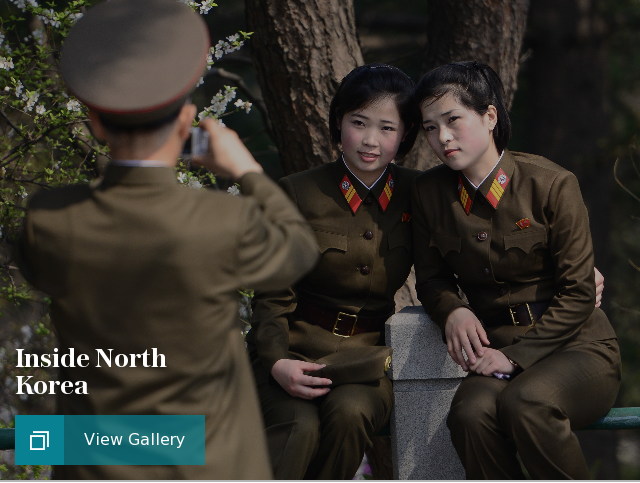
Kim Jong-un pictured today as North says South is 'hell-bent on escalating confrontation'
Kim Jong-un, leader of the North Korean regime, is pictured today in a a meeting with the Presidium of the Political Bureau of the Central Committee of the Workers' Party of Korea.
After South Korea overnight carried out live-fire drills in the wake of Sunday's nuclear test, state media in the North reports that Seoul is "hell-bent on escalating confrontation".

China lodges official protest with North Korea
China said it has lodged an official protest with its ally North Korea following Pyongyang's largest-ever nuclear weapons test.
The massive explosion, which Pyongyang claimed was a miniaturised hydrogen bomb, has put the region on edge and raised questions about how Beijing will respond to its neighbour's latest provocation.
China "launched stern representations with the person in charge of the DPRK embassy in China", foreign ministry spokesman Geng Shuang told a regular press briefing, using an acronym for the North's official name.

China brands Trump's trade threat 'unacceptable' and 'unfair'
China says President Donald Trump's threat to cut off trade with countries that deal with North Korea is unacceptable and unfair.
Trump said on Twitter on Sunday the United States is considering halting trade with "any country doing business with North Korea".
The United States is considering, in addition to other options, stopping all trade with any country doing business with North Korea.
— Donald J. Trump (@realDonaldTrump) September 3, 2017
Geng Shuang, a Chinese Foreign Ministry spokesman, told reporters at a briefing in Beijing on Monday that China regarded as "unacceptable a situation in which on the one hand we work to resolve this issue peacefully but on the other hand our own interests are subject to sanctions and jeopardized."
Geng said: "This is neither objective nor fair." China is the North's closest ally and commercial partner.
Russia warns 'clumsy steps' over North Korea could lead to 'explosion'
Sergei Ryabkov, the Russian Deputy Foreign Minister, has said that any "clumsy steps" regarding North Korea could make the situation worse and a political resolution was needed for the crisis.
"Those who are stronger and smarter should show restraint," Ryabkov told reporters at a BRICS summit in China. "Any clumsy step could lead to an explosion."
South 'still seeing signs that North is planning to stage more ballistic missile launches'
South Korea's defence ministry said in a parliament hearing on Monday it was still seeing signs that North Korea planned to stage more ballistic missile launches, possibly including an intercontinental ballistic missile.
"We have continued to see signs of possibly more ballistic missile launches," said Chang Kyung-soo, a defence ministry official.
"We also forecast North Korea could fire an intercontinental ballistic missile."
The defence ministry was called by parliament on Monday to answer questions about North Korea's sixth and largest nuclear test that was carried out a day earlier.
South Korea launches live-fire exercises to simulate attack from North
After the North's test of a nuclear bomb at the weekend, South Korea responded with live-fire exercises on Monday, with both ground and air-launched rockets.
The country's military fired missiles into the sea to simulate an attack on the North's main nuclear test site a day after Pyongyang detonated its largest ever nuclear test explosion.
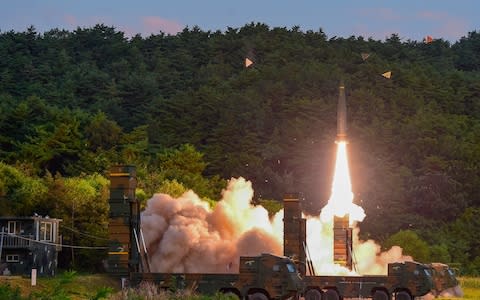

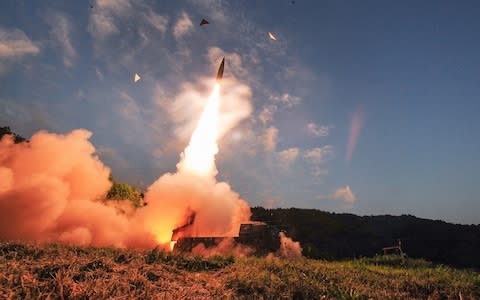
South Korea's military said its live-fire exercise was meant to "strongly warn" Pyongyang.
The drill involved F-15 fighter jets and the country's land-based "Hyunmoo" ballistic missiles firing into the Sea of Japan.


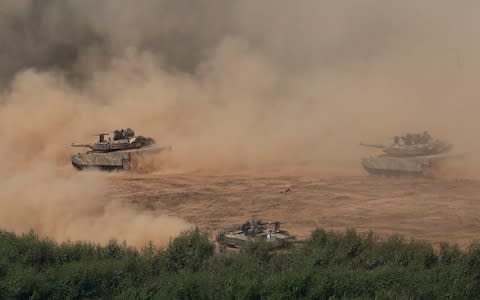
The target was set considering the distance to the North's test site and the exercise was aimed at practicing precision strikes and cutting off reinforcements, Seoul's Joint Chiefs of Staff said.
Each new North Korean missile and nuclear test gives Pyongyang's scientists invaluable information that allows big jumps in capability.

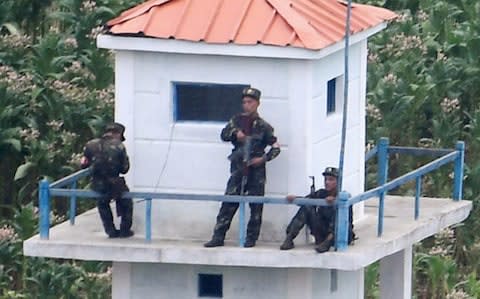
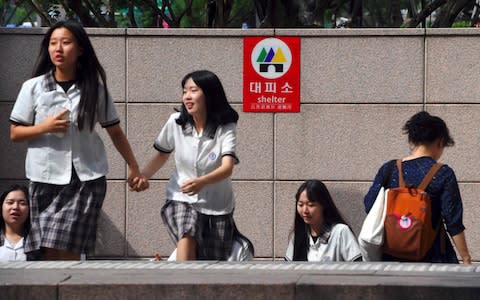
South Korea's defence ministry also said it would temporarily deploy the four remaining launchers for a major new US missile defence system after the completion of an environmental assessment by the government.
The rollout of the controversial Terminal High Altitude Area Defense (THAAD) system, vehemently opposed by neighbouring China, had been delayed since June.
UN Security Council to hold emergency meeting after North Korean nuclear test
The United Nations Security Council will hold an emergency meeting in response to North Korea's most powerful nuclear test - as the Trump administration warned any threat to the US or its allies would trigger a "massive military response".
The meeting on Monday, at the request of the UK, US, Japan, France and South Korea, comes after Kim Jong Un's regime carried out its sixth test of a nuclear device.
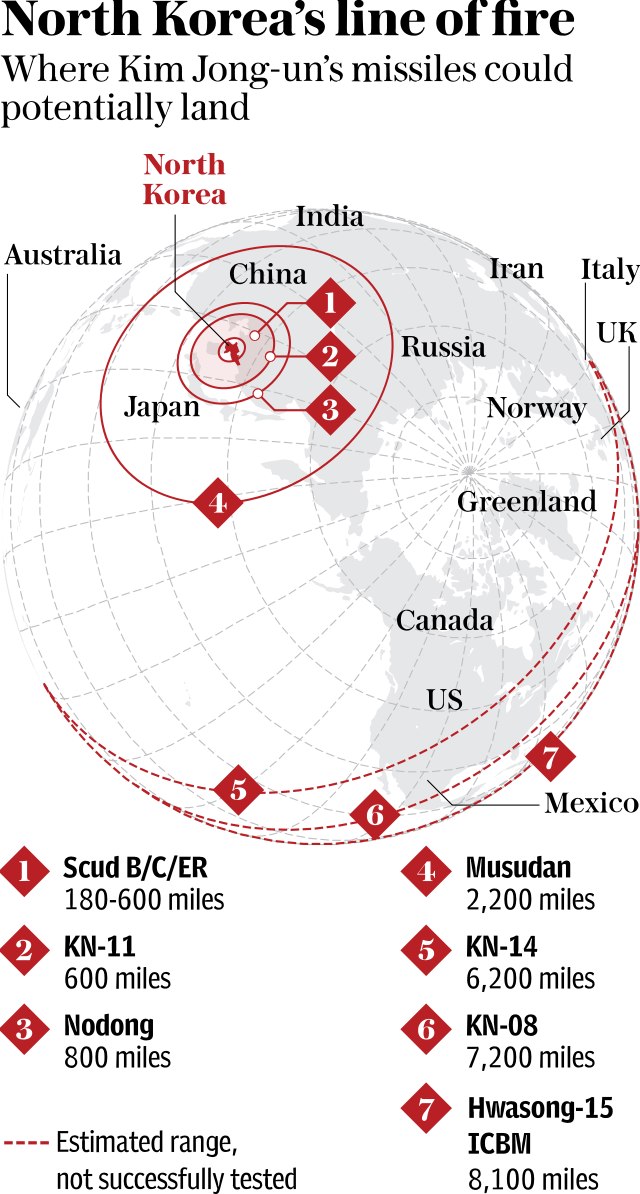
US defence secretary Jim Mattis briefed President Donald Trump about the military options available if the crisis escalated, adding that Washington was capable of launching an "effective and overwhelming" response.
While the US was "not looking to the total annihilation" of North Korea there were "many options to do so", he said.
Asked by a reporter during a trip to church services if he would attack the North, Mr Trump said: "We'll see."
But in the UK Foreign Secretary Boris Johnson cautioned against a military strike, because North Korea already had the ability to "vaporise" large parts of the population of South Korea even without nuclear weapons.
Prime Minister Theresa May said Pyongyang's actions posed an "unacceptable further threat to the international community" and urged world leaders to increase pressure on the regime.
The test blast came after propaganda pictures were published of Mr Kim examining what was said to be a nuclear warhead being fitted on to the nose of an intercontinental ballistic missile.
Mrs May reiterated the call for "tougher action, including increasing the pace of implementation of existing sanctions and looking urgently in the UN Security Council at new measures" she had made alongside Japanese Prime Minister Shinzo Abe during her visit last week.
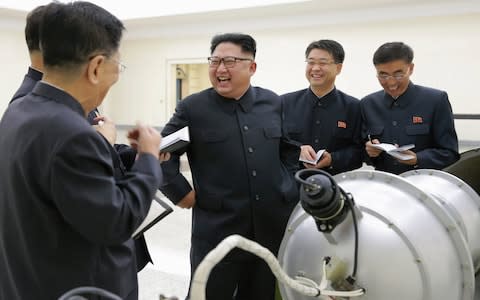
She said: "This is now even more pressing. The international community has universally condemned this test and must come together to continue to increase the pressure on North Korea's leaders to stop their destabilising actions."
Mr Trump branded North Korea "a rogue nation" and indicated that he was considering a trade boycott of nations that dealt with North Korea - widely viewed as a reference to China, although commentators questioned how the US would be able to take such a step.

The Foreign Secretary played down the prospect of military action although he acknowledged all options remained on the table.
Mr Johnson said: "There is no question that this is another provocation, it is reckless, what they are doing is, they seem to be moving closer towards a hydrogen bomb which, if fitted to a successful missile, would unquestionably present a new order of threat."
Arguing for a diplomatic solution, he said: "It's certainly our view that none of the military options are good. It is of course right to say that all options are on the table, but we really don't see an easy military solution."

The Chinese government "expressed firm opposition and strong condemnation" and urged North Korea to "stop taking erroneous actions that deteriorate the situation".
But Mr Johnson urged Beijing to go further in putting economic pressure on its neighbour.
He said: "Our message to the Chinese is, and we are working ever more closely with them, we think there is more scope for you, the Chinese, to put economic pressure on the North Koreans.
"It has worked, we have seen signs in the last six months of Chinese pressure actually changing the approach of North Koreans - let's see if we can do it again."
European Council president Donald Tusk said: "The EU stands ready to sharpen its policy of sanctions and invites North Korea to restart dialogue on its programmes without condition.
"We call on the UN Security Council to adopt further UN sanctions and show stronger resolve to achieve a peaceful denuclearisation of the Korean peninsula. The stakes are getting too high."
The artificial earthquake triggered by the North Korean test was several times stronger than from previous blasts and reportedly shook buildings in China and Russia.
The test was carried out at 12.29pm local time at the Punggye-ri site where North Korea has conducted nearly all of its past nuclear tests.
Officials in Seoul put the magnitude of the quake at 5.7 while the US Geological Survey said it was 6.3.


 Yahoo News
Yahoo News 